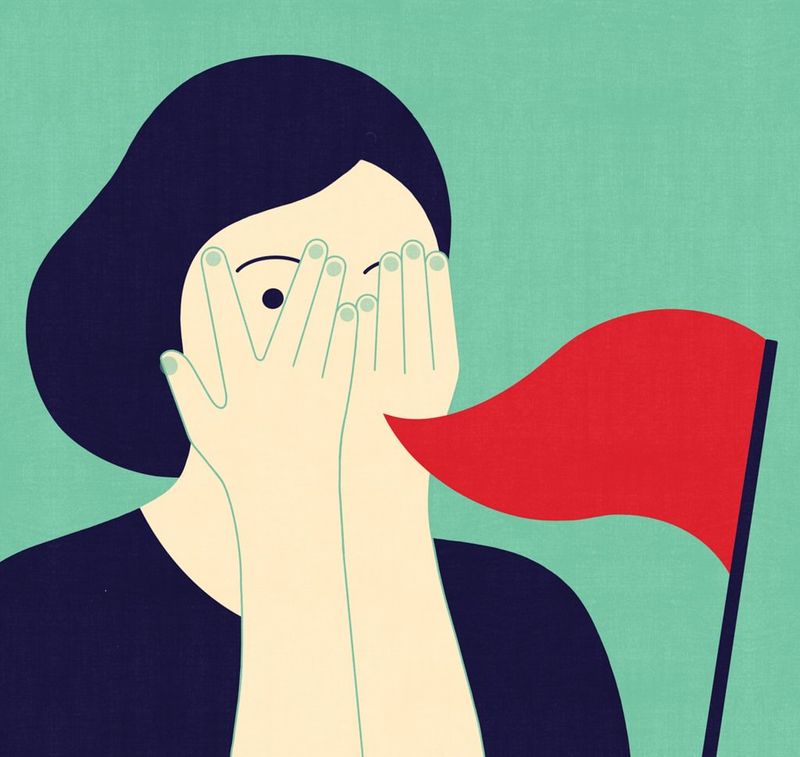16 Signs You’re Sticking Around In A Relationship Out Of Fear Of Starting Over
We often find ourselves lingering in relationships not because they are fulfilling, but because the prospect of the unfamiliar seems more daunting than enduring what has become routine.
The thought of uncharted territories can be paralyzing, leading us to stay in places that don’t nurture our genuine desires.
Here, we explore 16 signs that may indicate you’re holding on due to a fear of starting anew, rather than a true connection.
1. Rehearsing Break-up Speeches

In a quiet moment, you find yourself mentally crafting speeches that never escape your lips. Your heart races at the thought of confrontation, but your mouth remains still. These imagined conversations are a window to your true feelings, ones that you keep tucked away like secrets.
The words you wish to say loop in your mind, a dialogue only you are privy to. Yet, each time you muster the courage to voice them, fear grips you tighter.
Does this clandestine rehearsal reflect a deeper longing for change? Perhaps it’s your inner voice nudging you toward a path you’ve yet to explore. Acknowledging this inner dialogue can be your first step toward clarity.
2. Feeling Relieved When They’re Not Around

Imagine a space filled with tranquility, void of tension. When your partner is absent, peace washes over you like a gentle tide. This silence isn’t just refreshing; it’s a reminder of how serene life can feel.
However, the sensation of relief speaks volumes about your current state. Is their presence a source of unease, something that you’ve come to accept as normal?
This quietude reveals a stark contrast between your inner peace and the chaos that accompanies their presence. It’s a subtle nudge to question whether this relationship truly aligns with your need for serenity.
3. Convinced No One Else Would Want You

Standing before a mirror, doubts cloud your reflection. You convince yourself that no one else could ever want you. These whispers of insecurity aren’t truths but echoes of fear.
Your worth isn’t tethered to this relationship, yet you cling to it, believing it’s your only chance at being wanted. This belief can be as persistent as a shadow, but it doesn’t define you.
Breaking free from this self-doubt requires courage. Embrace the possibility that you are deserving of love, just as you are. Recognize these thoughts as fear’s voice, not reality’s verdict.
4. Telling Yourself Every Relationship Has Problems

In moments of doubt, you tell yourself that every relationship has its struggles. Yet, if your days feel more like an overcast sky than a sunny day, it’s worth examining.
While imperfections are part of any bond, feeling perpetually drained isn’t. These constant clouds might suggest that your relationship isn’t just weathering a storm but is caught in a cycle.
Acknowledging that not all challenges are equal can be liberating. It’s okay to seek sunshine rather than settle for shadows.
5. Fantasizing About Being Single

Caught in daydreams, you often imagine a life unanchored, where possibilities stretch before you like an open road. These fantasies aren’t mere whims; they’re inklings of a deeper desire for liberation.
In these dreams, you can envision yourself exploring new horizons unhindered by current constraints. Every imagined scenario speaks to a longing for independence that you’ve kept hidden.
Exploring these notions could be your subconscious seeking a way out of the comfort zone, urging you to embrace the freedom you crave.
6. Saying It’s Not That Bad

With eyes closed, you repeat, “It’s not that bad,” like a calming mantra. But if you need to convince yourself so frequently, perhaps you’re grading on a curve.
This reassurance is a balm for unease, soothing yet superficial. The act of continuous self-persuasion hints at deeper discontent brewing beneath the surface.
Listening to the underlying discomfort instead of dismissing it might reveal truths you’re hesitant to face. Is the mantra masking a more profound need for change?
7. Avoiding Future Plans

Each blank page on your calendar reflects an uncertain future. You avoid penciling in long-term plans, whispering to yourself that there’s always tomorrow.
This hesitance isn’t merely procrastination; it’s a sign that you might not see a shared future. The blank spaces speak volumes about your reluctance to commit to long-term visions.
Peering into these empty pages, consider if they echo your inner doubts about the relationship’s longevity. This avoidance might be a subconscious acknowledgment of your true desires.
8. Over-Explaining to Friends

In conversations, you find yourself defending your relationship, spinning tales to make it sound okay. The words tumble out, a sales pitch you hope will convince not just them but yourself.
This need to over-explain is like adding layers of paint to cover cracks, an unspoken understanding that things aren’t as rosy as they appear.
Consider if these explanations are more for your peace of mind than theirs. The urge to justify may be highlighting the truths you’re struggling to accept.
9. Missing Who You Were Before

Looking at old photographs, you reminisce about who you once were. That version of yourself, full of dreams and individuality, seems distant now.
In missing this person, you acknowledge a shift that’s occurred since your relationship began. This nostalgia isn’t merely sentimental; it’s a reminder that you’ve lost parts of yourself along the way.
Perhaps it’s time to rekindle that connection with your past self, embracing who you were and who you wish to become.
10. Staying Silent to Keep the Peace

With lips sealed, you keep your thoughts locked away to avoid conflict. The silence, meant to keep peace, becomes its own battle, trapping unspoken words.
Your restraint is an act of preservation, a method to shield harmony, but at what cost? The absence of dialogue can breed resentment in the quietude.
Consider whether the silence you maintain is worth the peace you hope to preserve. Is it time to break this self-imposed vow of silence and voice your truths?
11. Waiting for a Sign to Leave

Gazing through a window, you search the skies for a sign, a cosmic nudge to guide your next move. This waiting game keeps you tethered, hoping for clarity from above.
The truth is, the sign you’re waiting for may never come, because the decision rests with you. Your indecisiveness is rooted in fear, an uncertainty that keeps you suspended in the present.
Recognizing that you hold the power to decide can be empowering. Perhaps it’s time to trust your instincts and take the leap you’ve been contemplating.
12. Justifying Lack of Effort with Potential

With hopeful eyes, you gaze into the crystal ball, envisioning your partner’s untapped potential. You tell yourself that with time, things will change.
But clinging to potential is like chasing mirages—always in sight yet never tangible. The stories you craft about the future might be masking the realities of the present.
Consider if potential is enough to sustain a relationship. Partnership should involve mutual efforts in the now, not just promises of what might be.
13. Feeling Guilty for Wanting More

With open hands, you yearn for more but guilt whispers, questioning your right to desire. Your heart knows it seeks joy, yet you feel selfish for wanting beyond mere survival.
This guilt isn’t a reflection of greed but a testament to your unmet needs. It’s okay to wish for fulfillment, to crave a life that’s rich and whole.
Acknowledging these feelings might be the first step toward granting yourself permission to pursue them. Your desires are valid, not a betrayal of what you have.
14. Blaming Yourself for Their Behavior

With a puzzled expression, you carry a burden not yours to bear. You blame yourself for your partner’s actions, an emotional backpack filled with misplaced guilt.
This self-blame is a subtle form of emotional gaslighting, convincing yourself you’re at fault. Yet, their behavior isn’t a reflection of your worth or actions.
Recognizing this can be liberating. Lighten your emotional load by understanding where responsibility truly lies. You deserve to be free from this unjust weight.
15. Hoping Something Will Magically Shift

Clutching a magic wand, you hope for a miraculous shift, a fairy tale ending that erases current struggles. This belief in magic over action keeps you lingering.
Love isn’t a gamble with odds that magically tilt in your favor. It requires effort and honesty, not just wishful thinking.
Realizing that change comes from within, not from external miracles, might empower you to take control. Your happiness is a creation, not a stroke of luck.
16. Fear of Being Alone More Than Unhappy

At a crossroads, you stand, torn between solitude and unhappiness. The fear of being alone looms large, overshadowing the discomfort of your current state.
This crossroads is not merely a physical place but a mental dilemma. You wonder if being alone is the true enemy or if feeling invisible in a relationship is worse.
Exploring these fears could reveal that solitude isn’t as daunting as it seems. Perhaps it holds the key to rediscovering yourself beyond the confines of companionship.







